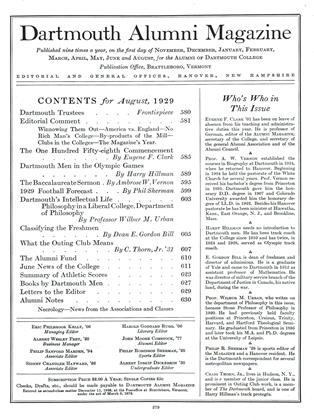Those who remember Henry W. Nevinson's "Farewell to America" in the London "Nation" of March 4, 1922, will the more keenly appreciate a little pamphlet recently printed by Stephen P. Duggan, Director of the Institute of International Education, entitled "Good-Bye, England" and following in form and idea the Nevison article—although, it might seem, with rather more kindliness. Mr. Duggan's passing reference to the contrast between British and American university ideals is very nearly the best thing in his amiable and appreciative brochure; and it may not be inappropriate to reproduce here, at least in part, what he says, because seldom has the difference between the American and the English college been better outlined in so few words.
Good-bye, Oxford and Cambridge, seats of traditional learning and teaching! Good-bye to venerable colleges, wonderful courts and beautiful "backs"; to comfortless quarters and attendant "scouts"; to "high-table" where soup is preceded by an unintelligible prayer and meat is followed by adjournment with napkin to another room for dessert and wine and coffee and delightful conversation. Good-bye to the rational curriculum which provides for concentration in studies and intercourse with teachers and a final examination in the entire field of study. Good-bye to students who scorn to be passmen and to modest dons who fear to dogmatize in their own subjects and profess complete ignorance in all others. Good-bye to Isis and Cam, to cricket and delightful days in punts, to sport for the sake of sport and the fun one gets out of it.
I'm going home! Home to colleges with comfortable dormitories arranged into delightful suites, with lounging rooms for girl students who smoke; colleges with wonderful gymnasiums, hygienic showers and inviting pools; true models of efficient administration and quantity production. Where sport is a spectacle and a combat applauded by 100,000 gathered in a stadium that dwarfs the Roman Colosseum, applauded—not spontaneously—for applause, like everything pertaining to sport, is "organized" and one claps and shouts at the signal of a cheer leader. I'm going home! Home where professors pontificate in all subjects and where the extra-curricular activities form the main interest of student life; where degrees are obtained by accumulating "credits" attached to subjects diffused over unrelated fields and elected by students who regard the passing mark as that of a gentleman, and who recover from "conditions" by securing additional "credits" at Summer sessions—at $10 each.
Read this and ponder, for there is more suggested than is actually said, and many a true word is spoken half in jest. Comment may be foreborne because needless. There is something like an indictment lurking under the implied criticism—and one would be rash indeed to say it is an indictment unjustified by the facts of our American attitude, both toward education and intercollegiate sport.
It does not follow that the indictment can be sustained on every count in open court. Certainly the ideals differ in the two countries; but it may be that our needs differ so radically from the British as to warrant the divergence as a matter of basic policy. It is further possible that in minor matters of detail our fleeting observations of British and European students fail to acquaint us sufficiently with all their idiosyncrasies. There are defects on both sides of the water; and in the matter of conduct when in unbuttoned mood, the revelations of recent jocund post-race nights, when Oxford and Cambridge lads let themselves loose on London, prompt the idea that American college boys are actually rather restrained and decorous.
 View Full Issue
View Full Issue
More From This Issue
-
 Class Notes
Class NotesCLASS OF 1879
August 1929 By Henry Melville -
 Article
ArticleAlumni Council Meetings
August 1929 -
 Article
ArticleThe One Hundred Fifty-Eighth Commencement
August 1929 By Eugene F. Clark -
 Class Notes
Class NotesCLASS OF 1899
August 1929 By Warren C. Kendall -
 Class Notes
Class NotesCLASS OF 1903
August 1929 By John Crowell -
 Class Notes
Class NotesCLASS OF 1918
August 1929 By Frederick W. Cassebeer








